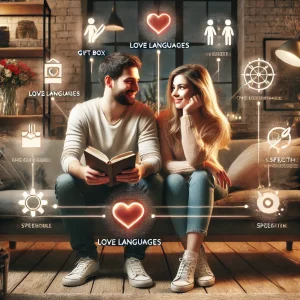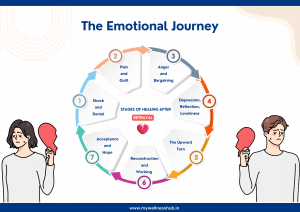Relationship tips: Are you wasting your time with the wrong person?
By Prapoorna M
Last Updated: February 8, 2023
In the journey of life, the decision to choose the right partner stands as a crucial crossroad, one that shapes our future and our emotional well-being. The modern dating landscape, with its myriad of choices and opportunities, often brings with it a host of dilemmas. In a world where options are endless and expectations varied, how does one discern if they are investing their time and emotions in the right person? This question resonates with many, as they navigate through the complexities of modern relationships, seeking a connection that endures beyond the surface level.
Book Relationship counselling now

The essence of a fulfilling relationship lies in the alignment of core values and expectations. However, recognizing the signs of a potential mismatch is not always straightforward. Red flags, often subtle, can go unnoticed, leading to prolonged investment in relationships that might not align with our deepest needs. In this discussion, we delve into the importance of aligning expectations, understanding values, and recognizing the red flags that signal a mismatch.
Our aim is to provide practical tips to help you objectively assess the health and direction of your relationship. Whether you’re in the early stages of a budding romance or deep into a long-term partnership, understanding these aspects is key to nurturing a relationship that is both fulfilling and aligned with your personal goals.
Let’s embark on this journey of discovery, equipped with insights and tools to help you discern the path to a harmonious and lasting partnership.
Recognizing Signs of a Mismatch
The foundation of a strong relationship is built upon shared values and aligned expectations. When these core elements diverge, it may indicate a potential mismatch that could lead to challenges down the road. Recognizing these signs early can save you from heartache and help you focus on relationships that are more likely to yield long-term happiness.
Common red flags include:
- Differing Life Goals: If you dream of traveling the world while your partner craves a settled, family-oriented life, these differing aspirations could spell trouble for your future together.
- Incompatible Communication Styles: Effective communication is the bedrock of any relationship. If you find constant misunderstandings or an inability to discuss important matters comfortably, it’s a sign worth paying attention to.
- Disparate Values: Core values, whether related to ethics, family, or personal growth, need to resonate with both partners. A disconnect in these fundamental beliefs often leads to conflict and dissatisfaction.
To objectively assess your relationship, consider these practical tips:
- Reflect on Your Feelings: Pay attention to how you feel when you are with your partner. Do you feel uplifted and understood, or do you often feel drained and unheard?
- Seek Honest Feedback: Sometimes, an external perspective can offer valuable insights. Talk to trusted friends or family members about your relationship dynamics.
- Evaluate Mutual Respect: A partnership thrives on mutual respect. Assess how well you and your partner respect each other’s choices, boundaries, and individuality.
Remember, the goal is not to seek perfection but to find a partnership that genuinely complements your life goals and values.
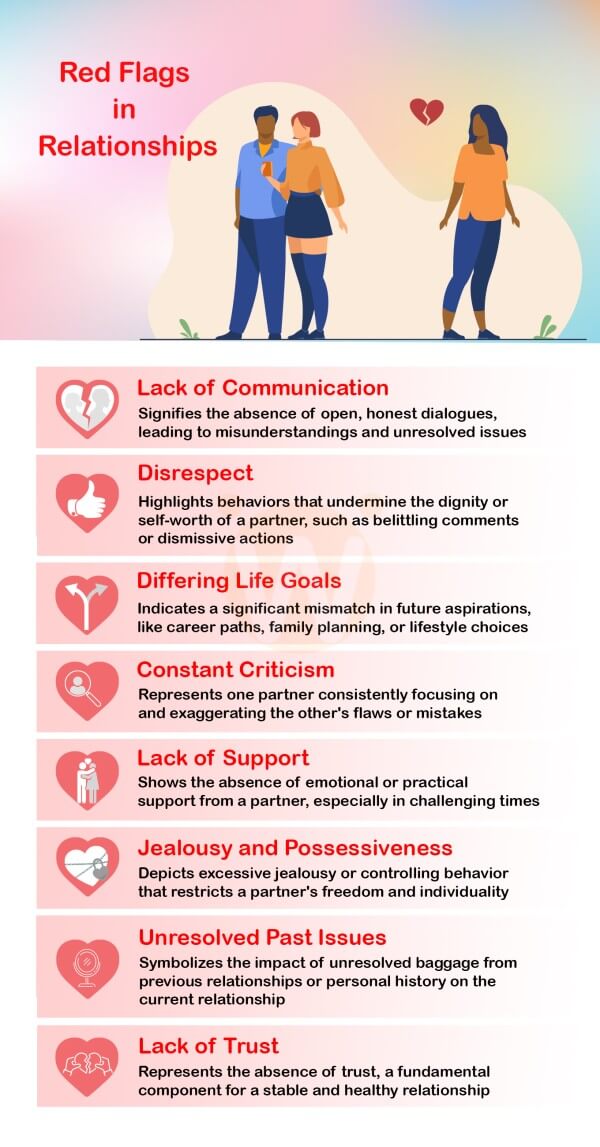
In our quest to support your journey towards healthy and fulfilling relationships, Wellness Hub offers a range of resources and professional guidance. While we don’t delve deep into Wellness Hub in this introduction, know that our website (Wellness Hub) is always available as a supportive resource in your relationship journey.
The Value of Self-Reflection
Embarking on a journey of self-awareness is a pivotal step in cultivating fulfilling relationships. It’s crucial to understand and acknowledge your personal needs and desires within a relationship. This introspection is more than just a self-check; it’s about deepening your understanding of what you truly seek from a partner.
Reflective questions play a significant role in this process. They guide you to unearth your true feelings and expectations. Consider these questions as you evaluate your current relationship:
- What are my non-negotiable values in a relationship? Understanding your core values helps in identifying if your relationship aligns with them.
- Do I feel fulfilled and valued in my current relationship? This question helps in assessing the emotional health of your partnership.
- What are my future aspirations, and does my partner support them? This reflects on how well your partner’s vision intertwines with yours.
Reflection Questions for Self-Awareness
| Question | Purpose |
|---|---|
| What are my core values in a relationship? | Helps identify what is non-negotiable and deeply important to you in a partnership. |
| Do I feel genuinely happy and fulfilled with my partner? | Assesses emotional satisfaction and fulfillment in the current relationship. |
| How do my life goals align with those of my partner? | Ensures that future aspirations and plans are compatible with your partner’s. |
| In what ways do I feel respected and valued by my partner? | Evaluates the level of mutual respect and appreciation in the relationship. |
| Can I be my true self around my partner? | Determines the authenticity and ease of your relationship. |
| What have I learned from my past relationships? | Encourages learning from previous experiences to avoid repeating patterns. |
| How does my relationship contribute to my personal growth? | Gauges the impact of the relationship on your individual development and self-improvement. |
Self-reflection is not a one-time task but an ongoing process. It evolves as you grow and as your relationship progresses. Embracing this journey of self-discovery can lead you toward more meaningful and compatible relationships.
Understanding the Role of Compatibility
Compatibility is often the cornerstone of long-term relationship success. It’s not just about sharing similar interests but also about how well your personalities, values, and life goals align. Understanding and identifying compatibility issues is vital in building a relationship that can withstand the tests of time.
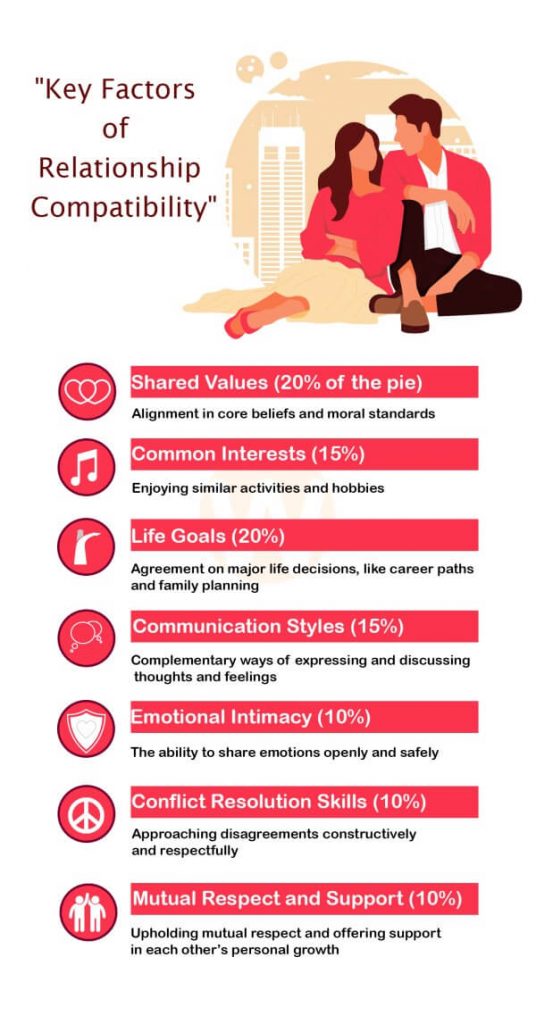
Here’s how you can address compatibility in your relationship:
- Communication and Understanding: Regular, open conversations about your thoughts, feelings, and future plans can highlight areas of compatibility and differences.
- Respecting Individual Differences: Compatibility doesn’t mean being identical. It’s about respecting and appreciating each other’s differences.
- Balancing Emotional and Practical Aspects: A sustainable relationship finds a balance between emotional connection and practical life considerations, like financial planning or career goals.
Addressing compatibility issues might require adjustments and compromises from both partners. It’s about finding a middle ground where both can thrive without losing their individuality.
At Wellness Hub, we understand the complexities of modern relationships. Our resources and expert guidance (as found on Wellness Hub) offer support in navigating these challenges. We encourage you to explore our site for more insights and tools to enhance your relationship journey.
The Importance of Communication
Communication is the lifeline of any relationship. It’s not just about talking, but about how effectively you convey your thoughts, feelings, and expectations. Open and honest communication is key to understanding and being understood by your partner.
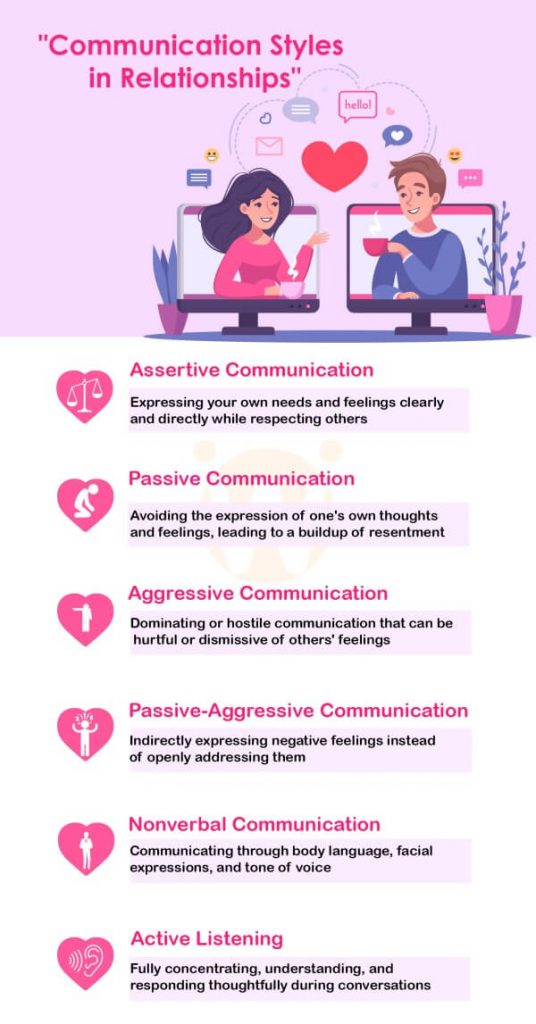
When approaching difficult conversations, especially those concerning the future and commitment, it’s essential to be clear, kind, and constructive. Here are some guidelines:
- Choose the Right Moment: Timing can significantly impact how your message is received. Find a calm, neutral time when both of you are not preoccupied or stressed.
- Express Your Feelings Clearly: Use “I” statements to express your feelings without blaming or accusing your partner.
- Listen Actively: Ensure you listen to your partner’s perspective without interrupting or jumping to conclusions.
Understanding each other’s communication styles and patterns is also crucial. Some people might be direct, while others are more nuanced in their expression. Recognizing these patterns can prevent misunderstandings and help in building a stronger connection.
Learning from Past Relationships
Reflecting on past relationships can provide invaluable insights for your current or future partnerships. Each relationship, whether successful or not, carries lessons that can guide us in making better choices and improving how we relate to others.
Here are some ways to learn from past relationships:
- Analyze Past Mistakes: Understand what went wrong and why. This could be about communication, compatibility, or personal issues.
- Identify Patterns: Sometimes, we unconsciously repeat certain patterns in relationships. Recognizing these can prevent you from making similar mistakes.
- Apply Lessons in Present Relationships: Use your past experiences to inform your current decisions and interactions.
It’s important not to dwell on past relationships but to use them as stepping stones towards healthier, more fulfilling future relationships.
At Wellness Hub, we believe in empowering our readers with the tools and knowledge to build strong, healthy relationships. For more insights and guidance, explore our resources on Wellness Hub. Our articles and expert advice are designed to support you in your journey towards relationship success.
Remember, the journey to finding and maintaining a healthy relationship is ongoing. It’s about learning, growing, and continuously striving to communicate better and understand deeper. Stay tuned for more insights as we continue to explore the many facets of relationships.
Setting Realistic Expectations
In the quest for a fulfilling relationship, it’s crucial to navigate the fine line between seeking a ‘perfect’ partner and embracing a real, flawed human being. Media and societal pressures often paint an unrealistic picture of romance and partnerships, leading many to chase ideals that don’t exist in reality. These skewed expectations can set relationships up for failure, as partners might continually fall short of these unattainable standards.
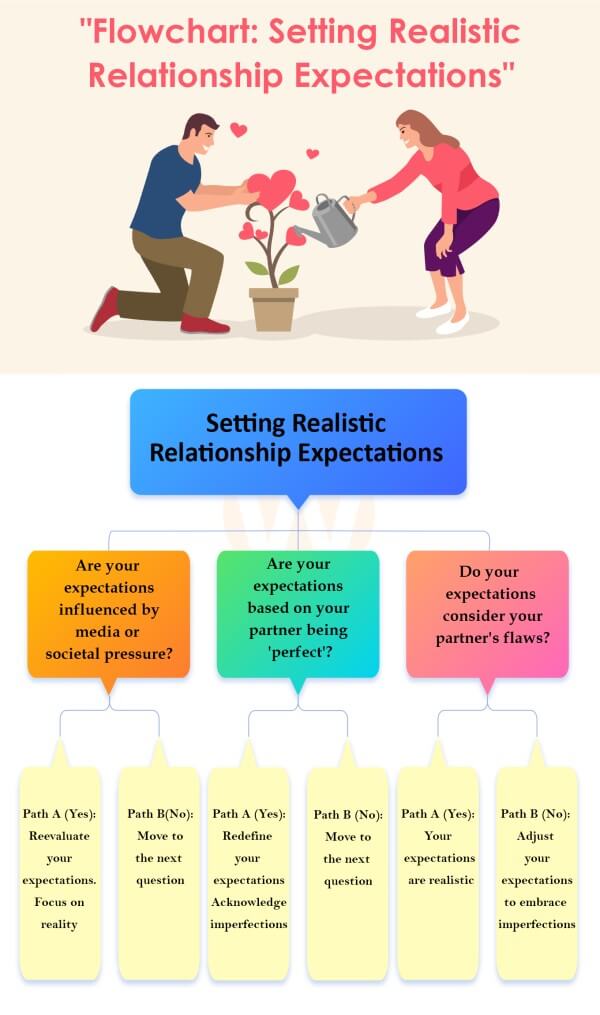
To set healthy, realistic expectations in relationships, consider the following advice:
- Acknowledge Imperfections: Understand that everyone has flaws and that a healthy relationship involves two imperfect people who are willing to work together.
- Focus on Core Values: Instead of seeking perfection, prioritize core values and qualities that are most important to you in a partner.
- Communicate Expectations: Have open discussions with your partner about your expectations to ensure you’re both on the same page.
Setting realistic expectations is not about lowering your standards, but about fostering a relationship based on understanding, mutual respect, and genuine connection.
Making Decisions for Your Happiness
Your happiness and well-being should always be at the forefront when making decisions in your relationship. Whether it’s deciding to stay and work on issues or to leave a relationship that no longer serves you, these decisions require courage and self-awareness.
Here are some perspectives to consider:
- Prioritize Your Well-being: Your happiness is paramount. If a relationship consistently causes more pain than joy, it’s important to reassess its place in your life.
- Assess Personal Growth: Consider whether the relationship contributes to your personal growth or holds you back.
- Seek Support When Needed: Making these decisions can be challenging. Don’t hesitate to seek support from friends, family, or professionals at Wellness Hub.
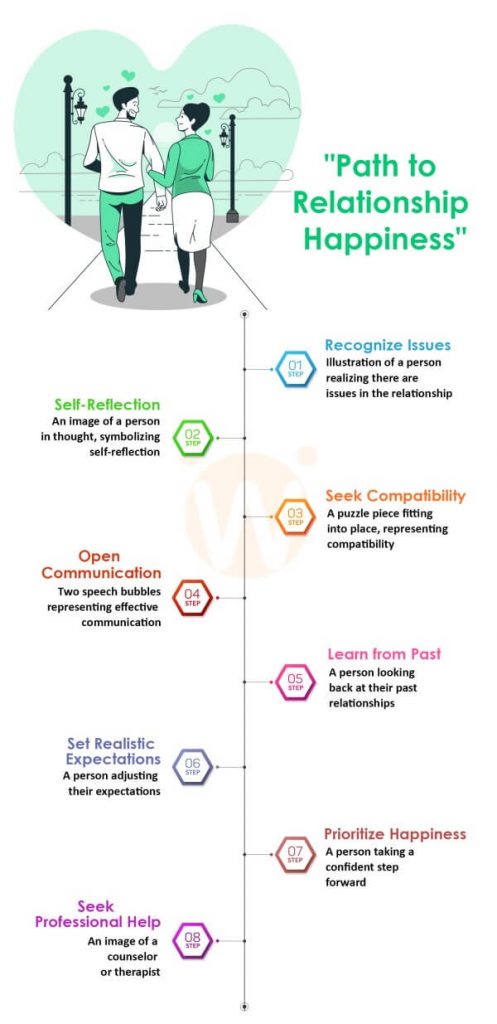
Remember, making choices that align with your personal growth and happiness is not selfish; it’s necessary for your overall well-being. At Wellness Hub, we provide resources and support to help you navigate these decisions. Our goal is to empower you to make choices that enhance your life and lead to lasting happiness. Explore more on this topic and find additional support at Wellness Hub.
As you continue on your journey towards relationship fulfillment, keep in mind that the choices you make should contribute to your overall happiness and growth. Stay tuned for more insights as we explore the dynamics of healthy relationships.
Seeking Professional Help
There comes a point in a relationship journey where professional guidance can be a beacon of hope and a pathway to deeper understanding. Relationship counseling is not just a remedy for troubled waters; it’s also a proactive tool for nurturing a healthy, vibrant partnership. Consider seeking professional help if you find recurring issues, feel stuck in a communication rut, or when you simply want to enhance your relationship’s strength.

The benefits of relationship counseling include:
- Gaining New Perspectives: A professional can offer unbiased insights and strategies to resolve conflicts.
- Improving Communication Skills: Learn effective ways to communicate and understand each other’s needs.
- Strengthening Emotional Connection: Counseling can deepen your emotional intimacy and connection.
Benefits of Relationship Counseling
| Benefit | Description |
|---|---|
| Improved Communication Skills | Counseling provides tools and techniques to enhance clarity, empathy, and effectiveness in how partners communicate with each other. |
| Enhanced Conflict Resolution | Helps couples develop strategies to address and resolve conflicts constructively, without causing harm to the relationship. |
| Deeper Emotional Intimacy | Assists in breaking down barriers to emotional closeness, fostering a stronger, more intimate bond between partners. |
| Better Understanding of Each Other | Offers insights into each other’s perspectives, backgrounds, and expectations, promoting mutual understanding. |
| Personal Growth and Self-Reflection | Encourages individual self-awareness and growth, which can positively impact the dynamics of the relationship. |
| Rebuilding Trust | Focuses on healing from past hurts and rebuilding trust where it has been broken or eroded. |
| Strengthening Relationship Foundations | Works on reinforcing the core values and strengths of the relationship, providing a more robust foundation for future challenges. |
| Developing Healthy Coping Mechanisms | Teaches healthy ways to cope with relationship stress, personal issues, and external pressures that may impact the partnership. |
At Wellness Hub, we recognize the importance of such guidance in maintaining and improving the quality of relationships. Our platform offers resources and professional advice tailored to your unique relationship needs. For those seeking to enhance their relationship dynamics, we invite you to explore the various services and support options available at Wellness Hub.
Conclusion
Throughout this exploration of relationship dynamics, we’ve delved into the importance of recognizing mismatches, the value of self-reflection, the critical role of communication, and the significance of setting realistic expectations. We’ve also underscored the courage needed in making decisions for your happiness and the benefits of seeking professional help in navigating relationship complexities.
As you venture forth in your relationships, remember that the journey towards a healthy, fulfilling partnership is continuous and evolving. It requires patience, understanding, and a willingness to grow both individually and together.
We encourage you to take proactive steps towards nurturing your relationships. Whether it’s through self-reflection, open communication, or seeking professional advice, every effort counts in building a strong, lasting bond.
Stay hopeful in your quest to find the right partner. Relationships, with all their challenges and rewards, are a profound part of the human experience. With the right tools, mindset, and support, you can foster a relationship that is not only enduring but also enriching.
For more insights and support on your relationship journey, remember that Wellness Hub is here to help. Visit our website for resources and guidance designed to assist you in cultivating healthy, meaningful connections. Together, let’s embark on a path towards relationship wellness and fulfillment.
Frequently Asked Questions for “Relationship Tips: Are You Wasting Your Time With the Wrong Person?”
1. How do I know if my relationship expectations are realistic?
Realistic expectations are those that focus on core values and mutual respect rather than perfection. Reflect on what is truly important to you in a relationship, such as honesty, communication, and emotional support, rather than idealistic traits or materialistic attributes.
2. What are some red flags to watch out for in a relationship?
Key red flags include a lack of communication, disrespect for boundaries, differing life goals, and feelings of consistent unhappiness or unease. If these issues persist even after addressing them, it might be time to reassess the relationship.
3. When should I consider relationship counseling?
Consider counseling if you’re facing ongoing issues that you can’t resolve together, if you feel stuck in a communication rut, or if you want to strengthen your relationship proactively. Counseling can be beneficial at any stage of a relationship, not just when problems arise.
4. How important is compatibility in a relationship?
Compatibility is crucial for long-term relationship success. It involves aligning on core values, life goals, and mutual respect. While some differences are natural, major discrepancies in fundamental aspects can lead to long-term issues.
5. Can past relationships really impact my current one?
Yes, past relationships can impact your current one, especially if there are unresolved issues or patterns. Learning from past mistakes and understanding what didn’t work can help you make healthier choices in your current relationship.
6. Is it okay to prioritize my happiness in a relationship?
Absolutely. Prioritizing your happiness is essential. A healthy relationship should add to your life, not detract from it. If you consistently feel unhappy or unfulfilled, it may be time to reevaluate the relationship.
7. How can I improve communication with my partner?
Improve communication by being open and honest about your feelings, listening actively, and respecting each other’s viewpoints. Regular, constructive conversations can strengthen your understanding and connection.
8. What should I do if I identify a mismatch in my relationship?
If you identify a mismatch, try discussing it with your partner first. If the issues are irreconcilable and you find your core values or life goals are too different, it might be healthier to part ways.
9. How can Wellness Hub help with my relationship concerns?
Wellness Hub offers a range of resources, including articles, counseling services, and expert advice, to address various relationship concerns. Whether you’re facing communication issues, compatibility questions, or seeking general relationship guidance, Wellness Hub can provide support and insights. Visit Wellness Hub for more information.
10. Is it normal to have doubts in a relationship?
Yes, it’s normal to have doubts at times. What’s important is how you address these doubts. Open communication with your partner and self-reflection can help clarify these feelings.
About the Author:
Prapoorna Mangalampalli
M.Sc., M.A., (Dual Masters in Psychology & English) – Counselor (6+ years of experience)
Prapoorna armed with a passionate dedication fueled by dual Master’s degrees in Psychology and English, Prapoorna sheds light on and elevates human experiences. Over 6+ years of experience fuel her insightful approach to counseling, offering profound empathy and guidance across diverse areas like online, marital, relationship, child, family, and career counseling.
At Wellness Hub, she thrives in a team environment that values innovation, compassion, and achieving results for their clients.
Connect with Prapoorna to learn how she can help you or your loved one find their voice and build a brighter future.
Book your Free Consultation Today
Parent/Caregiver Info:
Client’s Details:
* Error Message





